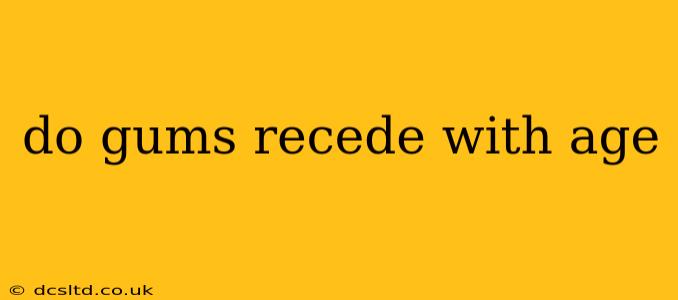Gum recession, the process where your gums pull back from your teeth, is a common occurrence that affects many adults. While it's often associated with aging, it's not simply a natural part of getting older. Several factors contribute to gum recession, and understanding these is crucial for prevention and treatment. This article will delve into the causes of gum recession, address common questions, and outline strategies for maintaining healthy gums throughout your life.
What Causes Gum Recession?
Gum recession isn't solely caused by age. While the aging process can contribute to weakening tissues, several other factors play a significant role:
- Aggressive Brushing: Brushing your teeth too hard or using a hard-bristled toothbrush can damage gum tissue over time, leading to recession.
- Gum Disease (Periodontitis): This is a major culprit. Bacteria build up along the gum line, causing inflammation and infection. This infection destroys the tissues supporting your teeth, leading to significant gum recession.
- Genetics: Some individuals are genetically predisposed to thinner gum tissue, making them more susceptible to recession. Family history plays a role.
- Teeth Grinding (Bruxism): The constant pressure from grinding or clenching teeth can put excessive stress on the gums, causing them to recede.
- Hormonal Changes: Fluctuations in hormone levels, particularly during pregnancy or menopause, can make gums more sensitive and vulnerable to recession.
- Certain Medical Conditions: Some medical conditions and medications can increase the risk of gum recession.
- Piercings: Oral piercings, particularly those near the gum line, can irritate the gums and contribute to recession.
- Improper Flossing: Incorrect flossing techniques can injure the gums.
How Can I Tell If My Gums Are Receding?
Noticeable signs of gum recession include:
- Longer-appearing teeth: Your teeth seem longer than they used to because more of the tooth root is visible.
- Sensitive teeth: Exposed tooth roots are more sensitive to temperature changes and sweets.
- Bleeding gums: While bleeding gums can indicate other issues, it can also be a sign of gum recession.
- Loose teeth: In severe cases, gum recession can lead to tooth loss.
- Changes in the way your teeth fit together: Gum recession can alter the bite.
Is Gum Recession Reversible?
Unfortunately, gum recession is often not completely reversible. However, depending on the severity and underlying causes, treatment options can help prevent further recession and improve the overall health of your gums. These may include:
- Scaling and root planing: This deep cleaning procedure removes plaque and tartar buildup beneath the gum line.
- Gum grafting: This surgical procedure uses tissue from another area of your mouth to cover the exposed tooth roots.
- Guided tissue regeneration: This involves using special membranes to encourage the growth of new gum tissue and bone.
Does Gum Recession Always Lead to Tooth Loss?
While gum recession can significantly increase the risk of tooth loss, it doesn't automatically mean you'll lose your teeth. With proper treatment and diligent oral hygiene, it’s often possible to prevent further recession and save your teeth.
How Can I Prevent Gum Recession?
Preventing gum recession involves proactive oral hygiene and regular dental checkups:
- Gentle Brushing: Use a soft-bristled toothbrush and brush gently with short, back-and-forth strokes.
- Proper Flossing: Floss daily to remove plaque and food particles from between your teeth. Use the correct flossing technique.
- Regular Dental Checkups: Schedule regular checkups and cleanings to catch gum disease early.
- Mouthwash: Using a therapeutic mouthwash may help reduce bacteria.
- Address Bruxism: If you grind your teeth, talk to your dentist about options like a mouthguard.
Can I Reverse Gum Recession at Home?
While you can't completely reverse gum recession at home, maintaining excellent oral hygiene is crucial to preventing further recession and protecting your teeth.
In conclusion, while gum recession is often associated with age, it's primarily caused by a combination of factors. Maintaining good oral hygiene, regular dental visits, and addressing any underlying issues are key to preventing and managing gum recession and preserving your oral health. If you're concerned about gum recession, consult your dentist for personalized advice and treatment options.
